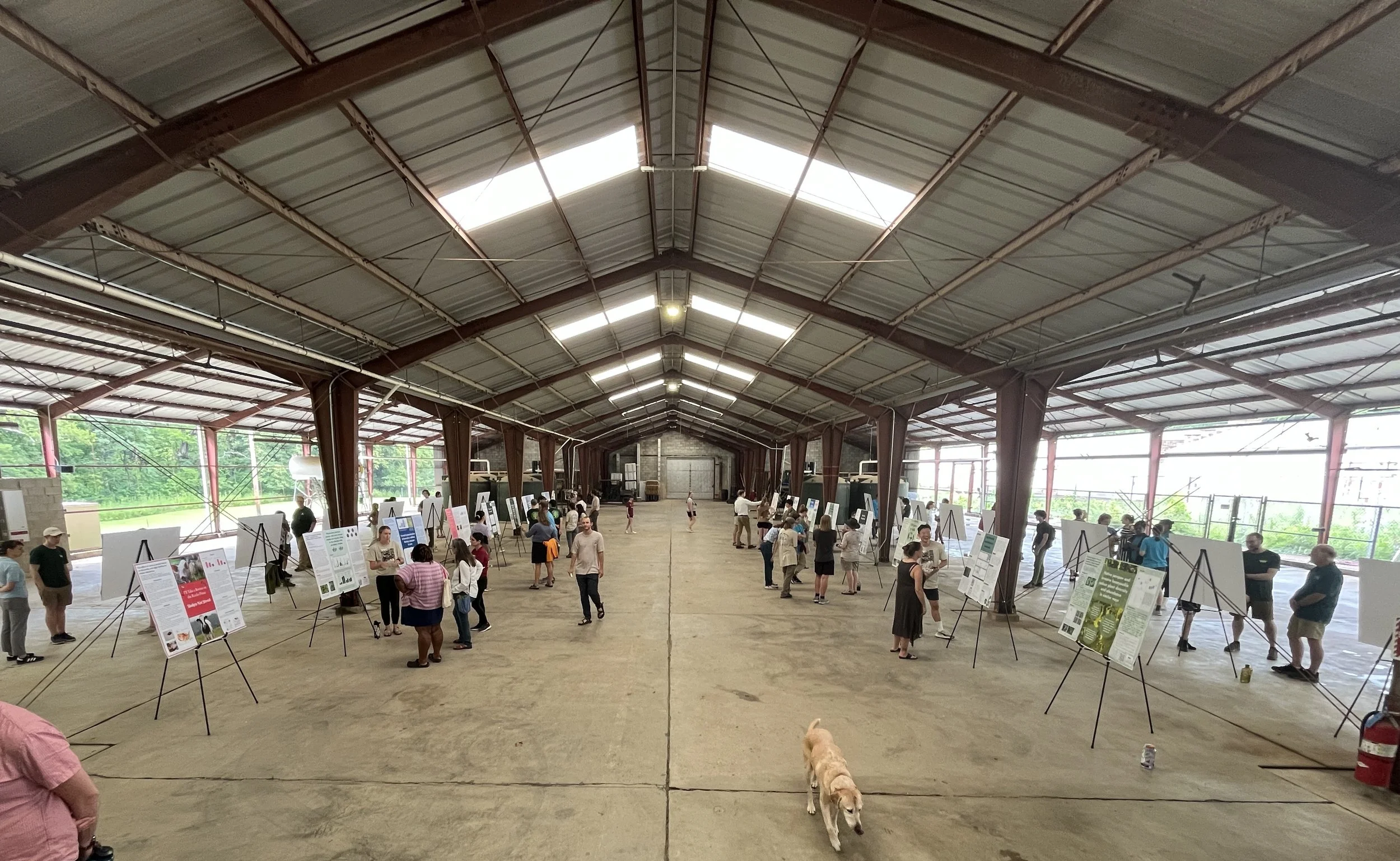Oct 26, 2023
On May 30, the front gate of Tyson Research Center opened…and opened…and opened again. This summer marked the 21st cohort of the Undergraduate Fellows Program, in which college and high school students work elbow-to-elbow with mentors on environmental research projects. Along the way, students round out their experience with science communication training and professional development opportunities; however, with a record number of researchers arriving on Day 1, Tyson staff needed to reimagine the possibilities of the educational programming and make changes to a longstanding structure.
Just some of Tyson’s research community during summer 2023
2023 saw the largest ever cohort of the summer program - 28 undergraduate fellows and 7 high school TERAs (Tyson Environmental Research Apprentices) spread across 8 different research teams - as well as plenty of planning and coordination to support the increased capacity. Staff scrambled to purchase two used cars to add to Tyson’s existing fleet of vehicles. And with the lab building completely full, a conference room in the Living Learning Center had to be quickly converted to serve as one team’s research outpost.
“We had to use every seatbelt, every meeting space, create new lab space too,” said Susan Flowers, Education, Outreach, and DEAI Coordinator and mentor of Team Humans. “It was enormous. So that was a big piece for us - how do we deal with this many young people and make sure they’re all attended to? But we handled it. It all worked really well.”
But Susan pointed out the busy summer transformed Tyson through more than just logistical shifts.
Christy Edwards, PhD, talking with students about her role with the Center for Conservation and Sustainable Development at the Missouri Botanical Garden.
“It was big, and that did impact things onsite at Tyson, but it also impacted things away from Tyson. A lot of vehicles were going offsite, hitting that urban-suburban-rural gradient for more projects than in past summers. The Plant Disease Team was doing work in school gardens. We envision Tyson as a hub, a landing pad, that then goes out into the larger community.”
The exchange went both ways. As research teams extended past Tyson’s gate, local scientists were also coming in to help further students’ career development. Visiting Professionals Happy Hour, held on six Thursday afternoons over the course of the summer, was a space to network over drinks and snacks. Researchers of all different stages - high schoolers, undergraduates, grad students, and seasonal technicians - met professionals of all different fields.
University of Illinois graduate student and former Tyson undergraduate fellow Derek McFarland sharing his research on the impact of human-mediated landscape change on human tick-borne disease risk across the St. Louis area.
“Conservation, land management, wildlife, disease ecology, environmental education, consulting, sustainability, public health, software engineering,” rattled off Beth Biro, Staff Scientist and a mentor of the Tick and Wildlife Ecology Team. “We made it a broad swath of people because we know the students have a wide range of environmental interests. It was really important to show them all those different career paths.”
The final change came at the very end of the summer. The Undergraduate Fellows Program places an emphasis on science communication, teaching students how to effectively explain their work to an outside audience. For many years, training conducted during weekly colloquium sessions would prepare students to deliver 5-minute presentations of their independent research to the Tyson community. With 35 people, however, this setup was no longer feasible.
“We were trying to get creative and think about ways people wouldn’t be glued to their seats to hear about all the research,” Susan said. “And so we decided to host our own poster symposium.”
People starting to gather for the first Tyson end-of-summer poster symposium on August 3, 2023.
The afternoon of August 3rd, an expanse of cement flooring behind the lab building transformed from warehouse space to research stage. Every undergraduate fellow and TERA stood beside an easel and poster, conversing about their summer’s work with interested attendees.
“We wanted it to be a public event celebrating the end of the season,” Susan said, “so we did have a lot of people coming to see it, including some of the visiting professionals who the students networked with and met over the course of the summer.”
Maya Irvine, an undergraduate fellow of the Pawpaw Patrol, studied the abundance and diversity of plants growing in pawpaw and bush honeysuckle patch understories. With previous research experience and lots of guidance from her mentor Anna Wassel, she remarked feeling particularly prepared and eager for the Tyson poster symposium.
Undergraduate fellow Maya Irvine collecting data on the abundance and diversity of plants in the forest understory.
“What I loved most was everyone’s hard work culminated into a final product,” Maya said. “I was both so excited to share my findings and seeing what the other Tyson fellows had spent so much time doing this summer.”
Maya, along with six other summer program participants, will go on to present her Tyson research at the Washington University Fall Undergraduate Research Symposium on October 27. She credits Tyson for fostering a newfound love for ecology research.
“The scientific community at Tyson is such a welcoming, positive environment, and I’m beyond grateful that I was able to experience it. Everyone at the symposium was buzzing with excitement and questions about the research everyone had done, and that environment really allowed for my confidence to blossom.”
About the author
Colleen McDermott is an undergraduate at Washington University in St. Louis studying environmental analysis and writing. They created Placemaking Tyson during summer 2022 and currently serve Tyson as Communications Associate.






